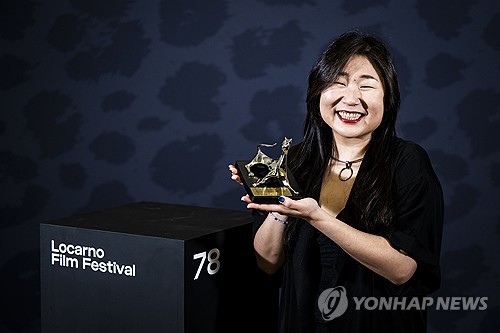“The audience-built stage welcomed Cecilia Kang”
Applause in Locarno did not die down that night.
On August 16, 2025, the air in Locarno, Switzerland, felt taut with tradition and discovery.
At one screening session of the Locarno Film Festival, the new-director prize was announced, and a single title rose above the rest.
The winner named was director Cecilia Kang and her debut feature, Hijo Mayor ("The Eldest Son").
Reportedly a second-generation Korean-Argentinian (a child of Korean immigrants in Argentina), Kang’s award immediately drew attention from international outlets.
The moment mattered because a new-director prize can mark a clear career turning point.

A small ripple made a big wave
The Locarno Film Festival is an established event founded in 1946 that often champions art-house films and emerging filmmakers.
Compared with Cannes, Venice, and Berlin, Locarno has built a reputation as a launchpad for directors experimenting beyond mainstream cinema.
Within that context, the new-director prize carries more than a trophy: it connects early work to global critics and programmers.
Therefore the award’s value goes beyond recognition.
It can be a bridge to international festivals, distributors, and future collaborations.
Cecilia Kang’s Hijo Mayor looks likely to be remembered as one such connection.
Why did this film stand out at Locarno?
Even a short scene carried traces of a personal life.
Hijo Mayor is introduced as a finely observed film about family, identity, and intergenerational conflict.
Critics say Kang’s experience as a Korean-Argentinian subtly informs the story without turning it into an autobiography.
Locarno tends to favor films that turn intimate stories into universal moments.
So it is plausible the jury and audience found Kang’s balance of personal detail and wider resonance persuasive.
At the same time, the film’s aesthetic polish—composition, sound design, and pacing—was frequently cited in reviews.
In favor: the merits of a new-director prize
Opportunity creates new language.
Locarno’s new-director prize gives emerging filmmakers an international platform, helping voices from diverse backgrounds grow.
Kang’s win is often read as an example of how festivals can practice inclusion in a meaningful way.
Supporters argue the award energizes the creative ecosystem.
A second-generation filmmaker being recognized on a global stage can broaden perceptions of what Korean-descended artists contribute to world cinema.
Artists and critics praised Hijo Mayor for its sensitive insights into family and identity.
Moreover, Locarno’s tradition of valuing experimentation provides a tolerant setting for new filmmakers to try formal and narrative risks.
That environment may, over time, expand the kinds of cinematic expression available to audiences.
From this angle, the award enlarges cinema’s cultural capital.
Popularity versus artistry: a tug of war
An award can be both a blessing and a burden.
Some voices note that winners at art-house-oriented festivals do not always translate to box office success.
Films shaped primarily for festival audiences can struggle to reach general moviegoers, which raises concerns about long-term financial sustainability.
Critics caution that winning does not guarantee commercial viability.
Hijo Mayor may receive continued critical attention abroad while facing a different market response at home.
Also, festival taste can favor particular artistic codes, which risks privileging a narrow aesthetic or cultural outlook.
There is also a psychological cost.
Sudden international attention can generate intense expectations for a director’s next project.
Pressure of that kind may constrain creative freedom or make the second feature harder to realize.
Reading both views more closely
Both praise and skepticism are useful.
Supporters point to the new-director prize as a practical route to networks, funding, and visibility.
Cecilia Kang’s win fits a pattern where festivals introduce emerging filmmakers to global programmers and critics.
On the other hand, the critics’ concerns are not mere cynicism.
Art-house recognition does not automatically secure a long-term audience, and international juries may misread local cultural cues.
Balancing artistic achievement with audience accessibility remains an unresolved issue in contemporary cinema.
Past examples help contextualize these points.
Some Korean directors who earned early festival honors later expanded into diverse careers—from arthouse success to mainstream projects—showing a range of possible paths.
Yet other prizewinning films faded from view, reminding us that a one-off honor does not ensure permanence.
Conclusion: what does this award leave behind?
The award signals a beginning rather than an end.
Cecilia Kang’s new-director prize at Locarno is a milestone for her career and a prompt to reassess how filmmakers with multicultural backgrounds are seen internationally.
However, this recognition might be only a first step.
What matters next is the follow-through.
If Kang continues to make films and maintain dialogue with audiences, this prize could gain weight in hindsight.
Therefore the real test is how this moment connects to future work, distribution, and public engagement.
How do you think this win will change opportunities for Korean-descended directors and art-house cinema more broadly?
The question is left for readers to answer.
Cecilia Kang won Locarno’s new-director prize for her debut feature Hijo Mayor, a recognition that highlights the international visibility of a filmmaker with a multicultural background.
Locarno’s history of supporting new voices and art-house cinema helped frame the award, and critics noted the film’s artistic achievement.
At the same time, concerns about commercial reach, cultural bias, and the challenge of sustaining a career after festival success remain relevant.
In short, the award marks the start of a story whose long-term impact depends on the director’s future work and the industry’s willingness to follow up.